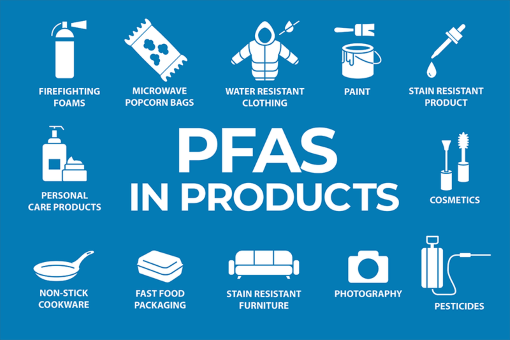Forever Chemicals and Female Fertility: Understanding the Link
Introduction
Chemicals are an integral part of our modern lives. However, some chemicals are more harmful than others. PFAS, also known as “forever chemicals,” are a type of synthetic chemical that has been linked to infertility in women. In this article, we will delve into the relationship between PFAS and female fertility.
What are PFAS?
PFAS, or per- and polyfluoroalkyl substances, are a group of man-made chemicals that are widely used in a variety of industries. They are used in products such as non-stick cookware, stain-resistant fabrics, and firefighting foams. These chemicals are called “forever chemicals” because they do not break down in the environment and can accumulate in the human body over time.

How do PFAS affect Women’s Fertility?
According to recent studies, women with higher levels of PFAS in their blood may have reduced fertility. A study conducted in 2023 found that PFAS exposure could lower a woman’s chance of getting pregnant by 40%. This is because PFAS can disrupt the hormone balance in the body, which is essential for reproductive health.
Effects of PFAS on Ovarian Reserve
PFAS chemicals can also affect the ovarian reserve, which is the number of eggs a woman has left in her ovaries. A study found that women with higher levels of PFAS in their blood had a lower ovarian reserve than women with lower levels of PFAS.
Effects of PFAS on Menstrual Cycles
PFAS can also affect menstrual cycles, leading to irregular cycles and heavier periods. This is because PFAS can interfere with the production of oestrogen, which regulates the menstrual cycle.
Effects of PFAS on Endometriosis
Endometriosis is a painful condition in which tissue similar to the lining of the uterus grows outside the uterus. Studies have found a link between PFAS exposure and endometriosis. Women with higher levels of PFAS in their blood are more likely to have endometriosis.
Studies on PFAS and Female Fertility
Several studies have been conducted to investigate the effects of PFAS on female fertility. A study published in the Journal of the American Medical Association found that women with higher levels of PFAS in their blood had a 27% lower chance of becoming pregnant. Another study conducted in Denmark found that women with higher levels of PFAS in their blood had a 40% lower chance of becoming pregnant.
Other Health Effects of PFAS
Apart from affecting female fertility, PFAS have been linked to several other health problems. These include cancer, liver damage, and developmental problems in children. PFAS can also affect the immune system, making it more difficult for the body to fight off infections.
How to Reduce Exposure to PFAS
Reducing exposure to PFAS is crucial for women who are trying to conceive. Here are some tips to reduce exposure to PFAS:
Avoid Non-stick Cookware
Non-stick cookware contains PFAS, so it’s essential to avoid using them. Instead, use stainless steel or cast-iron cookware.
Choose PFAS-free Products
Choose products that are labelled PFAS-free, such as waterproof clothing and personal care products.
Avoid Contaminated Water Sources
PFAS can be found in drinking water sources, so it’s essential to avoid using contaminated water sources.
FAQs:
What are PFAS chemicals?
PFAS (Per- and polyfluoroalkyl substances) are a group of man-made chemicals that have been used in various products, such as fire fighting foams, non-stick cookware, and waterproof clothing.
How do PFAS chemicals affect fertility in women?
Studies have found that women with higher levels of PFAS in their blood have a reduced chance of getting pregnant and are at a higher risk of infertility.
Can men be affected by PFAS chemicals as well?
While the focus of the studies has been on women’s fertility, research suggests that PFAS chemicals can also affect male fertility and may have other negative health effects.
What products contain PFAS chemicals?
PFAS chemicals have been used in a wide range of products, including non-stick cookware, food packaging, water-resistant clothing, and carpets.
How can I reduce my exposure to PFAS chemicals?
To reduce exposure to PFAS chemicals, it’s recommended to avoid using non-stick cookware, limit consumption of processed foods, use a water filter that removes PFAS, and avoid products labelled as “water-resistant” or “stain-resistant.”
Are there any regulations in place to limit the use of PFAS chemicals?
Several countries have taken steps to restrict or ban the use of PFAS chemicals, but there is still a lack of comprehensive regulations in many parts of the world.
References:
- The Guardian. (2023, April 6). Forever chemicals linked to infertility in women, study finds. Retrieved from https://www.theguardian.com/environment/2023/apr/06/forever-chemicals-infertility-women-pfas-blood
- Today. (2023, April 13). PFAS ‘forever chemicals’ may impact female fertility: What you need to know. Retrieved from https://www.today.com/health/womens-health/causes-infertility-pfas-forever-chemicals-rcna76528
- Euronews. (2023, March 24). Infertility: PFAS ‘forever chemicals’ may slash pregnancy odds by 40%, study finds. Retrieved from https://www.euronews.com/next/2023/03/24/infertility-pfas-forever-chemicals-may-slash-pregnancy-odds-by-40-per-cent-study-finds





